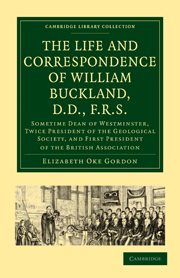 The Life and Correspondence of William Buckland, D.D., F.R.S.
The Life and Correspondence of William Buckland, D.D., F.R.S. CHAPTER VI
Published online by Cambridge University Press: 05 November 2011
Summary
“Agriculture feeds us; to a great degree it clothes us; without it we could not have manufactures and we should not have commerce. These all stand together; but they stand together like pillars in a cluster, the largest in the centre—and that largest is Agriculture.”
It has been most truly said that Dr. Buckland devoted all his varied scientific knowledge and experience to the benefit of his fellow-men. “This craving,” to quote the words of Professor Williamson, “to be useful in promoting the welfare of the world around him characterised his entire life.”
So far back as 1818 the subject of agriculture had occupied his attention. And, apart from the natural affinity between agriculture and geology, there were special circumstances in the condition of the time which appealed strongly to so ardent a philanthropist. The fall of prices after the Peace of 1815 produced wide-spread ruin, and, for the moment, the distress was aggravated by the displacement of labour which was temporarily effected by the introduction of machinery into agricultural operations. Riots of agrarian origin were not infrequent; machine-breaking, rick-burning, and the destruction of the shops of butchers and bakers, testified to the almost universal distress and discontent in country districts. Buckland's letters illustrate the disturbances, which became, from 1815 to 1845, a common feature in English rural life.
- Type
- Chapter
- Information
- The Life and Correspondence of William Buckland, D.D., F.R.S.Sometime Dean of Westminster, Twice President of the Geological Society, and First President of the British Association, pp. 150 - 172Publisher: Cambridge University PressPrint publication year: 2010First published in: 1894
